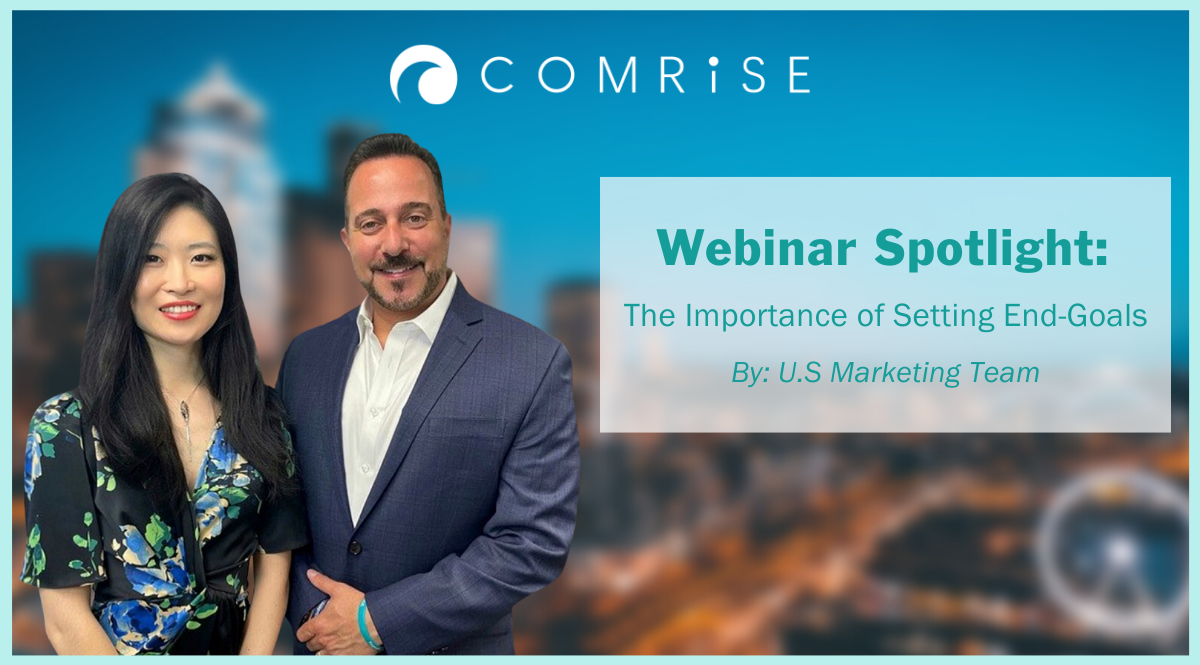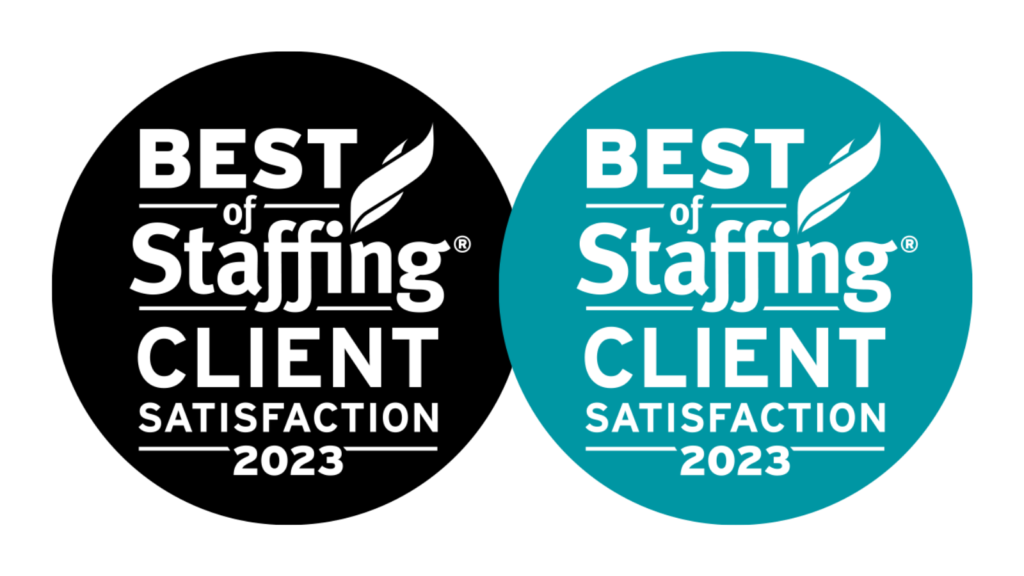On Friday, February 11th, we hosted our very first webinar of 2022: Working in the U.S vs China: The Importance of Setting End-Goals. The virtual event was hosted by Yunfan Li, Comrise Cross-Border HR Specialist, who dove into the critical importance of setting end-goals, along with the role that they play in your career journey. Our special guests, Chris Ciulla, President of U.S and Cross-Border Services at Comrise, and Jo Wang, Comrise Cross-Border Account Executive, shared a combination of clinical knowledge and first-hand experience that will help set international students up for success as they map out their personal and professional goals.
What are end-goals & why are they important?
In this section, Chris shared insight from his experience working with bicultural candidates. He spoke about the importance of making solid choices in your early-college years that will provide you with the most opportunities post-graduation.
“It’s important to remember that the choices you make now [as international students] will have a significant influence on the options that you have later on down the road,” Chris emphasized.
“For example, the major chosen by native U.S students determines what types of jobs might be available to them post-graduation. However, the major chosen by international students has a much greater impact… it impacts their ability to stay in the U.S post-graduation.”
“If you earn a STEM degree, you could get an OPT extension and could have up to three years to find a company that will sponsor you. So, if your end-goal is to stay in the U.S for employment post-graduation, you may have to make an education choice that will provide you with the most opportunity,” Chris explained.
When should I determine my end-goal?
Here, Jo dove into the importance of determining your end-goal as early as possible, especially if you’re looking to stay in the U.S post-graduation.
“I selected my end-goal very early-on… I always knew that I wanted to stay in the U.S for work after graduation. Determining this early-on was a huge help and allowed me to land a job in the U.S,” Jo explained.
Jo then spotlighted the value of having an open, ambitious, and motivated mindset. One way to achieve this is by setting a few short-term goals, which will essentially act as stepping stones throughout your career journey, guiding you towards success.
A few short-term personal goals could be learning a new language or culture, traveling, making new friends, being a part of groups or activities that interest you, etc. A few short-term professional goals could be to get good grades, the completion of all international student graduation requirements, gaining valuable work experience in your desired field, etc.
You should write these goals down, along with your long-term goal, and check-in with yourself to ensure that you are on the right track.
“Throughout my college years, I was always trying to improve and constantly found myself thinking of new ways that would help me reach my post-graduation goal. This made all the difference.”
What if I changed my mind and now have a new end-goal?
Although there are challenges associated with choosing a new end-goal, there are still steps to get back on track. Chris shared his experience with helping a non-STEM graduate that was referred to him.
She was working for a company under her OPT that did not sponsor non-STEM graduates. At the end of her OPT, she would be faced with the tough decision to go back home (after she had already established herself in the U.S.), or find a company that would be willing to invest in her sponsorship.
“I talked to her because Comrise offers sponsorship and we came up with a plan. I told her that I would talk to her end-employer, get to know them, and offer to sponsor and lease her back to that company to avoid risk. Through relationship building and hard work, we were able to accomplish her goal,” Chris explained.
It’s helpful to consult other students who have gone through a similar situation, legal experts, or bicultural professional experts, like Chris himself.
On the other hand, while Jo did not change her end-goal, she had reassuring advice for students in this situation.
“Change is not a bad thing. Anything can happen, so the key point should be to believe in yourself and put in all your effort. Whether you want to stay or go back home, consider all of your options and look into services that could help, like the services Comrise provides in both the U.S. and China.”
Should any factors or risks be considered when mapping out my end-goal?
In this section, Chris shares some potential risks that students may face while making their decision between remaining in the U.S. or returning to China. The risks can be simplified below:
- Leaving everything you know at home.
One challenge that comes with staying in the U.S. after graduation is leaving everything you are familiar with back home in China.
“I admire these students tremendously. They leave everything they know back at home to study in a foreign country where the predominant language is English, while working hard to learn and grow professionally,” Chris shared.
- Not making a decision.
When it comes to mapping out your end-goals and post-grad plans, the timing of your decision is extremely important. Ultimately, the steps you take leading up to your graduation date could potentially make the decision for you.
Chris highlighted Jo’s experience, who made an educational choice that created some risk. Since Jo did not choose a STEM major, she had to pay significantly through the CPT program.
“If you are unable to find a company that will sponsor you, the choice could be made for you by default. In this case, your choices consist of returning home to China or to continue education through a CPT program for your Master’s, which can be a really expensive financial risk,” Chris highlighted.
- The career you choose.
The major that you choose will play a significant role in finding a job. It’s critical to consider majors that are in-demand, whether you are returning home to China or planning to stay in the U.S. This can affect how easily you’re able to find a job and reach your end-goal.
“As a returnee, you’ll need an in-demand major, or if you’re here in the U.S., in order for someone to sponsor you, you must have an in-demand skill set,” Chris explained.
Jo then proceeded to share her story in further detail: “After my graduation, I worked several years in Beijing. Before I finally made my decision to come to the U.S, I had several things to think about. Will my skill set match the U.S market? Will my past work experience add more value? What will the business culture be like?”
Following, Jo added that the major she chose put her at risk. If she had a second chance, she may have asked herself “should I study what will help me achieve my end-goal, or should I study something that I truly enjoy?”. It’s best to find a strong balance of both.
Who could help guide me through the process?
In this section, Jo spotlighted her personal experience and shared insight based on what she learned.
“I was mostly on my own. When I encountered challenges, I went to my parents for advice and would also speak with my close friends. But it’s much better to speak with professionals who already went through the process and could provide guidance from their first-hand experience,” Jo said.
It’s important to remember that support and guidance are very different when it comes to this process. When it comes to emotional support, you may talk to your loved ones, such as family members or friends. However, it’s not recommended to consult them for guidance on the situation as they may provide a biased opinion.
Rather, it’s recommended that you consult a guidance counselor, someone in a legal capacity referred by the university, or a firm that specializes in partnering with bicultural professionals, such as Comrise.
If you weren’t able to attend our February webinar, we hope to see you at the next event! But, in the meantime, feel free to check out the record session here.
And to learn more about Comrise and how we could guide you through your career journey, be sure to check out our LinkedIn page or website. Together WE Can!


